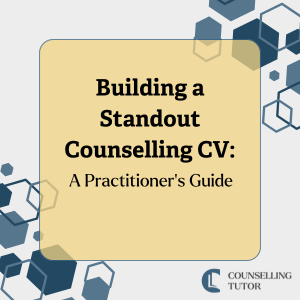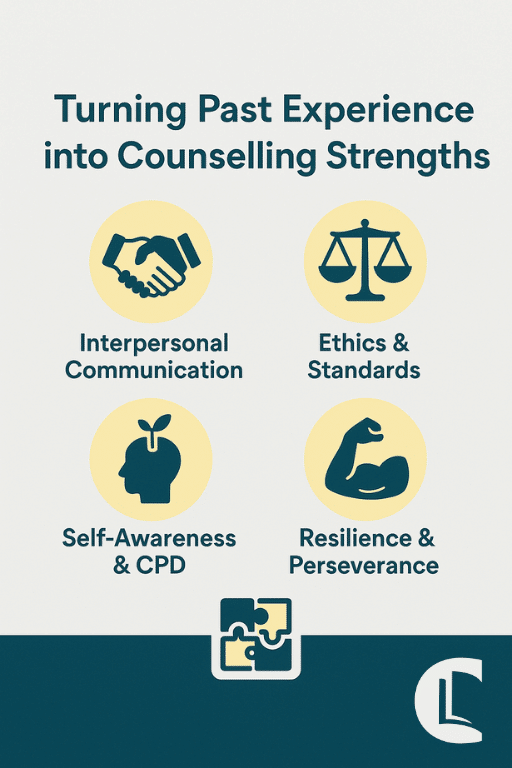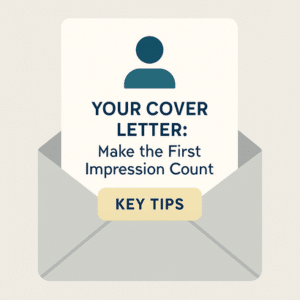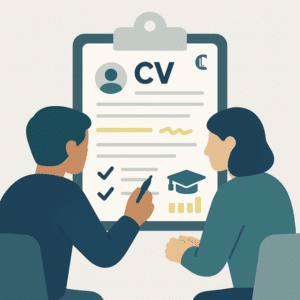Your Free Handout
Building Your Counselling CV
Crafting a counselling CV can feel daunting, especially if you’re transitioning from another career or seeking your first placement or paid role. Yet, in the world of psychotherapy, your CV is more than a list of credentials – it’s a professional narrative that reflects who you are as a practitioner. As a counsellor or psychotherapist, you don’t just offer skills and qualifications; you offer yourself. This article provides a comprehensive guide to crafting a CV that accurately reflects your values, strengths, and unique contributions to the field.

Building Your Counselling CV
By the end of this guide, you will understand how to:
Ken Kelly: Counsellor CV, curriculum vitae, the big word. It’s an interesting document, isn’t it? It’s the document that opens the doors.
Rory Lees-Oakes: Yes, there’s an old saying, and it’s you never get a second chance to make a first impression. And your CV is that chance to make a good impression if you are applying for a job, they usually ask for some kind of curriculum vitae, a kind of overview of your experience, your qualifications, who you are as a person, what hobbies you may have. And creating a CV can be a little bit daunting, certainly if someone has never written a CV before. So we produce this handout, which is gonna be really helpful for those who are looking to get paid work. And hopefully it’ll be able to really get your CV sparkling in front of recruiters.
And I think even if you’re not pursuing career in counselling. You may have got your counselling qualification, and may think I’d like to do something running alongside, support work, or any other job that would use counselling skills and I think being able to put together a curriculum vitae is gonna be really helpful and give you the best chance of getting a job, because it’s very competitive out there, Ken.
Ken Kelly: It is very competitive and I think that your CV as a counsellor is going to look and feel very different to a CV of maybe a different kind of career.
And I say that because I changed careers, and I recognised that the CV I had for my old sales director position had very little value if I was going to an agency and saying, I would like to come and work within your agency, and I had to be very smart in going through and looking at what are the skills that I used to use that are transferable now into this new CV.
But you’ve identified what somebody might be looking for in a CV, and we start off with interpersonal skills. So there’s an opportunity for me to bring my old relationship building within sales into my new CV, because that is an interpersonal skill. It’s talking to people and holding conversations. So there is value in what you’ve done in the past. It’s just smartly transferring that to a counselling setting and rather than just putting it in as a list of jobs that we used to do.
And then understanding of standards and ethics, that’s an important one, Rory. In counselling and psychotherapy we work to standards and ethics. We join an ethical body, we work to an ethical framework. Weaving into your CV your understanding of standards and ethics is going to only serve you, because the person that is reading that wants an ethical practitioner to be working within their organisation.
Self-awareness. That’s got nothing to do with a counselling course you did, or a bit of CPD that you might have done. But it is important for counselling and psychotherapy, and it’s something that you can bring into your CV, any kind of personal development work that you do, showing that you are self-aware, your commitment to learning and to personal and professional development. There’s another area that you can bring in that sits outside of your qualifications and what you’ve done.
So commitment to learning. You might be a member of the Counselling Tutor CPD Library, and mention CPD that you’re doing, or that you do regular CPD. But what the employer might be looking for is that you are committed to learning, specifically if you’re going into an agency or an organisation that works in a very niche area, they might be wanting to know that you are going to continue to train in those areas.
And then, and I think this is really I important for counsellors and psychotherapists, your mental toughness and perseverance. Because it’s a challenging role, Rory. And I guess if I was an agency owner and I was looking for a counsellor to come in, I would want someone who is robust, somebody who knows how to take care of themselves and will be able to stand up to the rigours of everyday practice.
And those are areas that don’t even touch on the studies that you did, or the level of studies that you did, or how many hours you’ve practiced, but all really valuable things to pop into your CV, Rory.
Rory Lees-Oakes: Yeah, absolutely, Ken. And one other thing that you could add in is any research that you’ve done.
We’re finding more and more now that agencies and organisations are research based, and the reason for that is because they draw down funding from the government usually, and the government want evidence of effectiveness. So if you could say that you’ve done a course in trauma informed practice and you are researching trauma, that’s gonna be mightily attractive to an organisation that is working with trauma.
That is basically supporting clients who’ve had traumas, because if you can evidence what research you did, even if it’s only at university level or college level, it shows that your ability to be able to take information, look at it, analyse it, and come up with a conclusion. And this is a very helpful trait in modern charities because they’re all research based and they’re all looking to justify the money they’re getting from the government. So any research you’ve done is always a bonus, I think.
Ken Kelly: Yeah, definitely.
I know that one of the ethical bodies in the United Kingdom is about to hold its research conference and it will be packed because it’s important and it underpins what we do and how we practice as counsellors. So if you’re showing any kind of research, and that might even be a small research project that you did at a level five.
It doesn’t have to have been a master’s degree research piece of work. It’s just showing your ability to understand research and undertake research in a methodical way. So we’re talking about this CV now, and I’m working from the handout, it’s really comprehensive and it breaks it down. We’re gonna start off by going through four areas that are identified as being important when you’re looking at your CV as a counsellor or a psychotherapist. And the first one is planning the content. We do the plan first, the pencil out, the plan of what this is gonna look like, then the structuring of that content within a CV in a way that it’s gonna make sense to the person that you’re handing that over to.
And then this is an important one. It is the adding of a covering letter and this covering letter, you’ll see when we get to it, might be different for each CV that you submit. It’s going to show how you are relevant and how your qualifications are relevant to the opportunity that is open that you’re putting your CV in against.
And then checking and getting feedback. I think this is an important one, having somebody read over it, somebody saying, oh, there’s a typo, I would’ve structured that differently. Getting feedback from your peers. They may say, oh, but what about this that you did? You haven’t put that in there.
And it really can be helpful getting that feedback. But let’s start off with the planning of the content, Rory. And I know that we’ve put some possible content that you might consider putting in, and it’s gonna be your qualifications, your work experience, any CPD training. You’ve got your skills and the knowledge that you hold is gonna be the content, but it’s about how that gets put together and how you look at that, Rory.
Rory Lees-Oakes: Yeah, absolutely. And I think that you need to start off with the most important things first. Any recruiter is gonna be a very busy person and they don’t want to wade through huge amounts of documents stratified out about you. So if you could put your experience and knowledge in a very concise A4 page, you’re gonna have an advantage.
So I’ll start off with your name and a little bit about yourself. Contact details, where you live, your qualifications. And there’s quite a lot of transferable skills, you know in terms of filing reports, turning up on time.
So there’s quite a few things that you could bring over from your previous work, which leads us into work experience, and you can talk about your responsibilities. And what’s really good, I think, you start off working in a cake shop. You start off as a shop assistant, then you end up as the supervisor, and then you move on, and then you become the manager. That shows a progression of work, but also shows that someone has looked at you and thought we could promote this person to do different things. Even if you’ve got a very humble work record, don’t be afraid of using it.
And then of course, CPD training. We’ve talked a lot about 21st century counsellors and I think that a lot of employers would want something like being trauma informed. If the role requires you to work on a telephone, then online and telephone counselling.
So I think it’s really important that you talk about your CPD or any other kind of specialist interest that you keep looking at. It could be, for instance, working with people who have been divorced.
And then professional membership, I think it’s always important that you talk about your professional memberships because that shows that you’re a committed professional. That you’ve joined a professional body, are now accountable to them. And again, that is something that employers are looking for. Ultimately, any employer’s looking for accountability, Ken?
Ken Kelly: Oh, very much. It’ll probably be in the job description, that is a prerequisite. it’s interesting that we both share sales roles in the past, and there’s one thing that we learn in sales and marketing that we learn again in counselling.
So listening to this, this is gonna make sense to you, whose frame of reference are we in? When we are in a counselling session, we are in the client’s frame of reference, and it’s the same with sales. When somebody comes in to buy something, you wanna be in the customer’s frame of reference. You’ll be more successful as a salesperson there.
Now, here’s the tip, the same is true if you’re putting your CV together. It’s not about what you want to tell them, think more what is it that they want to hear from me? Look at the job description, go and look at their website, understand who they are. Put yourself in their frame of reference. What do you think it is that they are looking for?
But there’s another secret ingredient that is gonna make you stand out from your peers, and that is bring yourself. Because here’s the thing, when you’re training to become a counsellor, you’re going to be looking at yourself very closely. You’re gonna be writing assignments about your personal and self-development through your arc of training.
Self in counselling is ultimately important. So bring your true, congruent self into your CV as well. Weave who you really are within that, because that’s where you become unique, that’s where you stand out from your peers.
The truth is, you want not just a job in counselling, you want the right job that matches your values and who you are, and I think that is worth, in some way, weaving into your CV. And it might be, what kind of a company are you looking to work within. In the same way as they’re interviewing you, you are interviewing them, and you can start that in your CV.
I value a team that is, blah, blah, blah. I work best within an environment that is blah, blah, blah. Speak about your values, because it’s gonna hit and resonate with the right agency. They’re gonna go, hey, this is us, we work like that, this person will fit in beautifully here.
So it’s important to find a job, but it’s more important to find the right job, the one that’s gonna resonate and fit for you.
Rory Lees-Oakes: Absolutely. And I think the value match is important from the perspective of the candidate. If the company’s values don’t fit yours, you’re gonna have a pretty miserable time and you’re not gonna get any kind of longevity in the work because your values will be tested and eventually you’ll say, I just can’t do this anymore.
And I think, integrity is a cornerstone of our profession.
And you can put that on your CV. You can say, I left the last job because I just didn’t feel their values were that of supporting clients.
I wanna touch on something I know that I tend to suffer with. There’s no such thing as a perfect CV. There really isn’t. And I think at some point you have to just send it. Don’t just hold onto it and go it’s gonna be perfect. And I’ll rewrite this and I’ll rewrite that. At some point you have to send it because there’s a been be a deadline. You’re not gonna wait forever. The employer and, if you are like myself, can dyslexic get someone to look over it.
And the other thing I would say is that it’s a good policy to have a copy of your CV and have a look at it before you go for the job. Because almost certainly the employer will ask you about things on your CV. And if you could answer that very confidently and in depth, that gives you a better chance.
Ken Kelly: A hundred percent, yeah. And the CV becomes the basis for the interview. They will be referring to it and asking you questions around it.
And that’s why it’s in interesting to put things like your hobbies or your interests within your CV. And if they can link in some way to self-care, instead of calling them hobbies and interests on your CV, you can say my self-care activities, horse riding, taking a walk, walking the dog, it just frames it differently.
And this is what this is about, how do you stand out from the other 10 CVs that are on the desk? Rory’s given you one super good tip, and I wanna reemphasise it. Make it short. A CV is not gonna buy you a job, the CV has got one job only, and it’s to open the door to the interview to create intrigue for them to go, I want to speak to this person. That’s where you sell yourself to get the job, not in your CV. Your CV has one job, get you in front of the interviewer. So make it short.
The second top tip is make it personal. So we’ve said, bring yourself into this, and a great place to do that is in your cover letter.
So the cover letter has got one job.Your cover letter is to create intrigue in the person, for them to actually want to read your CV. If your covering letter is not compelling enough, you can be dismissed without your CV actually being seen. They can look over the cover letter and go, you know what? That’s not really what we’re looking for. If you can, within your covering letter, stand out, be different and resonate with the person who’s reading it.
We’ve got an example of the cover letter as well, in the handout.
Any further thoughts or final thoughts on CV as a counsellor, Rory?
Rory Lees-Oakes: I think developing a CV is a good discipline. And if you are unsuccessful in your quest for the job, get feedback, ask why.
The CV is a door opener. And then the interview is the crucial element really. What they do, is they call you in for an interview and at that point, that’s your time to shine.
But don’t be afraid of a CV. Get someone to check it over and always keep it updated. So the more CPD you do, or the more qualifications, or if you change your ethical body, just keep your CV updated so it’s fresh and always ready to go.
The first hurdle many face is recognising the value of previous experience outside the counselling field. Whether you’ve worked in sales, teaching, or support roles, chances are you’ve developed interpersonal, organisational, and resilience-based skills that are highly relevant.
Highlight transferable attributes such as:
Rather than listing past roles as standalone jobs, contextualise them within your therapeutic identity. Show how they shaped the practitioner you are today.

Think like a recruiter. The most effective CVs are not about what you want to share, but what they need to see.
Use these practical strategies:
Agencies are often more interested in how you work and who you are than just your qualifications. Bring forward your passion, commitment, and how your modality and therapeutic style reflect your personality and professional philosophy.
A good structure aids clarity and demonstrates professionalism. A clear, concise, and well-ordered CV reflects your ability to communicate succinctly, an essential skill in counselling.
Your CV should include the following:
This should be at the very top of your CV.
A brief paragraph showing your personality, values, and why you chose counselling. Consider including a sentence or two about why you chose your counselling modality. Did you gravitate toward person-centred work because of its emphasis on empathy and unconditional positive regard? Or did an integrative approach resonate with your belief in flexibility and client uniqueness? This helps your CV reflect your therapeutic identity and values, beyond qualifications alone.
Include all relevant counselling and previous professional qualifications.
Focus on roles (paid or voluntary) that involved counselling or transferable skills.
List key topics such as trauma-informed care, online therapy, or safeguarding.
State your membership with ethical bodies (e.g. BACP, NCS).
Rename this section as “Self-Care Activities” to emphasise your emotional robustness and resilience. This demonstrates that you understand the importance of resilience, reflective practice, and modelling well-being for clients. For example, listing activities such as walking, meditation, or creative expression can signal emotional robustness, qualities essential for sustainable therapeutic practice.
Include any unique qualities, such as languages spoken, driving licence, or awards.
Keep it to one A4 page where possible. Your goal isn’t to get the job from the CV – it’s to get the interview.
Your cover letter is often the first thing a recruiter reads. It needs to spark interest and establish congruence with the organisation’s mission.
Key tips:

For speculative applications, explain why you are drawn to the organisation and how your skills may be a good match. This reflects initiative and genuine interest.
For your practice: Before sending your CV, take the time to proofread and polish it. Objectivity is crucial – step away, revisit with fresh eyes, or ask a colleague to provide feedback.
Checklist before submission:
Remember: “Good enough” is good enough. Don’t let perfectionism delay your application. Agencies hire humans, not robots – and authenticity often trumps polish.
Don’t underestimate the value of another set of eyes. Whether it’s a trusted peer, clinical supervisor, or even a friend with strong writing skills, external feedback can highlight omissions, suggest stronger phrasing, or catch minor errors. Even better, consider setting up a CV exchange group with fellow practitioners where you each review and support one another’s applications. As counsellors, collaborative reflection is second nature; apply this same ethos to your professional materials.
Remember, there is no such thing as a perfect CV. At some point, you simply have to send it. Done is better than perfect – what matters most is authenticity, clarity, and relevance.

Building Your Counselling CV
Your counselling CV should have a clear reverse‑chronological structure including: Name & contact details, a short personal profile, sections for Qualifications, Work Experience, CPD & Professional Memberships, followed by Hobbies or Self‑Care. Aim for no more than two A4 pages (one if you’re less experienced).
Write a concise statement (2-4 lines) that reflects your therapeutic style, relevant experience, qualifications, and motivation. Tailor it closely to the job by mirroring key terms from the job description and highlighting your values and ethical awareness.
Showcase active listening, CBT, assessment, crisis intervention, empathy, and case-management, as well as transferable skills like resilience and communication. Include evidence of CPD and professional memberships (e.g. BACP) and highlight any related research experience where relevant.
Your counselling CV is not just a professional summary – it’s an invitation. It introduces who you are, how you work, and what you bring to the therapeutic space. Treat it as an evolving document, updating it regularly with new CPD or experience, and use it not only to secure a job, but also to find the right job. The process of crafting your CV can also reaffirm your identity as a practitioner, clarifying what you value and how you want to contribute to the field.
Be strategic, be personal, and most importantly – be you.
Counselling Tutor provides trusted resources for counselling students and qualified practitioners. Our expert-led articles, study guides, and CPD resources are designed to support your growth, confidence, and professional development.
👉 Meet the team behind Counselling Tutor
Notice any broken link or issues with this resource? Kindly let us know by email
Email us